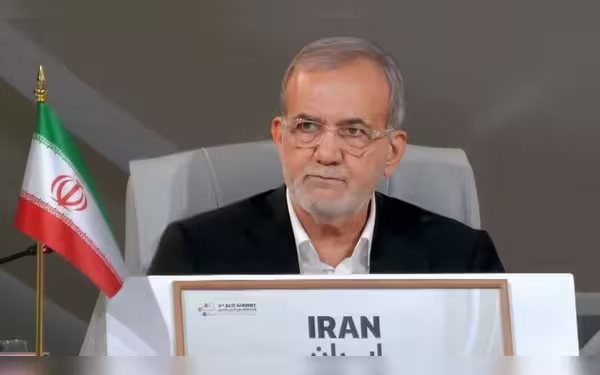Saturday, November 16, 2024 07:39 PM
Iran Urges Trump to Reconsider Maximum Pressure Policy
- Iran calls for change in U.S. policy towards the Islamic Republic.
- Foreign Minister labels assassination plot accusations as fabricated.
- Opportunity for diplomatic engagement between U.S. and Iran.
 Image Credits: channelnewsasia
Image Credits: channelnewsasiaIran urges Trump to change his maximum pressure policy, seeking dialogue amid accusations of conspiracy.
In recent developments, Iran has expressed a willingness to engage with the incoming U.S. President Donald Trump, urging him to reconsider the "maximum pressure" policy that characterized his previous administration's approach towards the Islamic Republic. This call for a change in strategy comes in the wake of serious accusations from Washington, which claims that Tehran was involved in a plot to assassinate Trump.
Mohammad Javad Zarif, Iran's Vice President for Strategic Affairs, emphasized the need for Trump to move away from the "wrong policies of the past." He made these comments during a press conference, highlighting the importance of a fresh start in U.S.-Iran relations. Zarif's remarks reflect a broader sentiment within Iran that seeks to shift the narrative from confrontation to dialogue.
In response to the allegations of conspiracy, Iran's Foreign Minister Abbas Araghchi took to social media platform X, labeling the accusations as "fabricated." He dismissed the claims as a poorly scripted drama, stating, "As a killer does not exist in reality, scriptwriters are brought in to manufacture a third-rate comedy." This strong rebuttal underscores Iran's frustration with what it perceives as baseless accusations from the United States.
Furthermore, the Iranian Foreign Ministry has categorically described the allegations as "totally unfounded," reinforcing the country's stance against what it views as unjustified hostility from the U.S. government. The tension between the two nations has been a longstanding issue, with the U.S. imposing various sanctions on Iran in an effort to curb its nuclear ambitions and regional influence.
As the world watches closely, the question remains: will Trump heed Iran's call for a new approach? The potential for diplomatic engagement could pave the way for a more stable relationship between the two countries, which have been at odds for decades. A shift in policy could not only benefit U.S.-Iran relations but also contribute to broader regional stability.
The unfolding situation presents a unique opportunity for both nations to reassess their strategies and possibly embark on a path toward reconciliation. As history has shown, dialogue often proves to be more effective than confrontation. The coming weeks will be crucial in determining whether a new chapter in U.S.-Iran relations can be written, one that prioritizes diplomacy over discord.












